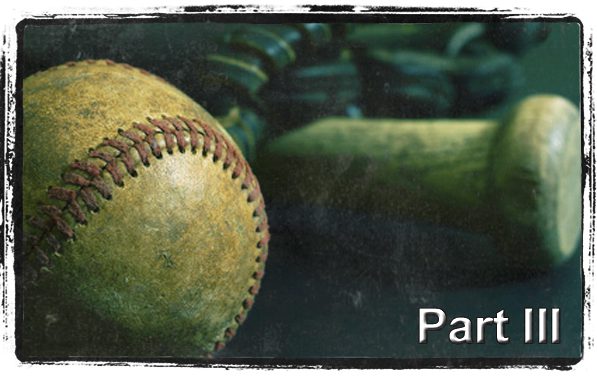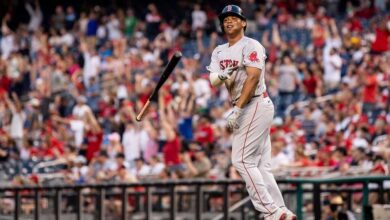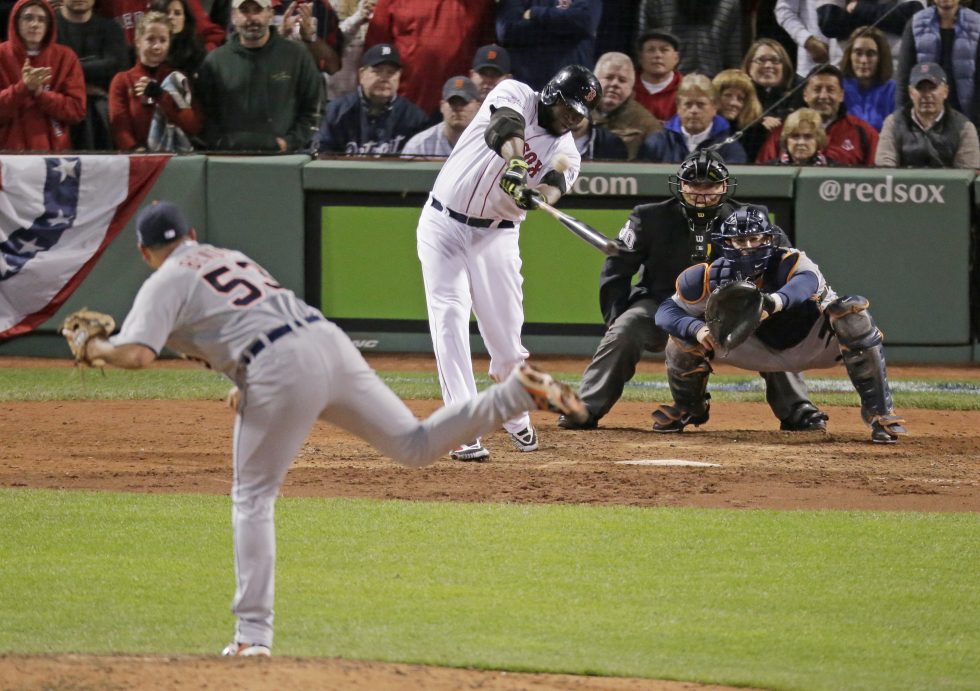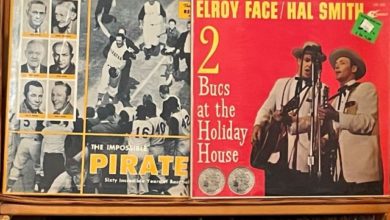
Editor’s Note: Part III of a three-part series, where author Mark Moran takes us on a nostalgic journey back to his childhood baseball days. Mark shares how baseball changed for him as he got older. You’ll be hard-pressed not to relive your childhood if you’re 40 years old or older and you played youth baseball. Great writing and very entertaining. See Part I and Part II.
After Little League in Framingham comes Senior League. The equivalent of Babe Ruth Leagues in other towns, Senior League includes kids ages 13, 14 and 15.
Senior League: Age 13
One of the biggest adjustments that Little Leaguers have to make when we sign up for Senior League is getting used to the size of the field. At age 13, we leave behind the smaller field (46 feet from the pitcher’s mound to home plate; 60 feet between bases) for one the same size as in the major leagues. Yup, 60’6” from the pitcher’s mound to the plate, 90 feet between bases. And an awfully long throw from home plate to second base for a former Little League catcher who weighs only 112 pounds.
In search of a short throw, I decide to become a second baseman. I don’t start, but, like the younger kids in Little League, I get in for a couple innings at the end of each game. Once in a while, they throw me in to right field (in other words, hide me).
Along with the intimidating new dimensions of the bigger field come some intimidating new 15-year-old pitchers like Paul O’Neill and Alan Hoyt. Big, strong and confident, they may as well be Goose Gossage out there on the mound. How am I ever going to hit against these kids, who are in high school?
Last year, I could barely hit .220 on the small field … against kids my own size and age. This year, I’ll struggle to even hit a fair ball. Instead, I strike out a lot and hope I just walk. In one game, I hit a line drive foul down the first-base line.
“You were about an hour late on that one, Moran!” my coach yells at me from our bench. The other team’s catcher says, “You weren’t an hour late, or you would have missed it completely.”
Then there’s Dave “Gopher” Carter. He isn’t big and strong, but along with his big buck teeth, he possesses a wicked curve ball. And I have never even seen a bad curveball before. He sets up batters up with a couple of fastballs … then he comes in with that curve. The first time I see Gopher’s curve, it looks like that ball’s coming straight at my head. As I turn away and flinch, the ball dives and curves — right over the plate. Strike three … looking. How embarrassing.
During my first season, I do manage to get one big hit that helps my team, the Angels, win a game.
I come up with the bases loaded. Swinging hard in case I hit something, I bang a hard ground ball to the right side. As I run to first, I watch as the ball bounds between the first baseman and the second baseman … and into right field. I touch first base with a clean single, take an awfully short turn toward second, and hear my teammates’ cheers. The next day, the Framingham News says: “Rookie Mark Moran drove in two runs.”
After that, one of the older guys on the team started calling me Rookie. Acceptance.
Coach Duffy
Short and frumpy, in his 30s, with one eye perpetually half shut, the Angels’ coach reminds me of Peter Falk. He doesn’t have any kids on the team. He must just love being on a baseball field, like the rest of us. My first season in Senior League, I hear something from my new coach that I haven’t heard before or since in sports.
“Don’t argue with the umps,” says Brian Duffy. Not players, not coaches. “Even if you’re right, don’t argue with the umps,” he says. “They’re going to make mistakes, just like you are.”
Duffy goes further than that. He says that if you slide into a base, and you’re tagged out on a close play, and you are, indeed, out, you should stand up, say, “Good call, ump,” and trot back to the bench.

My new coach goes by the philosophy: “You catch more flies with honey than with vinegar.” Late in a close game, he figures, on a crucial call, the ump might subconsciously side with the team that’s been nice to him all night.
The prevailing philosophy then and now (and more so now) is to always argue with the ump. To berate him into being afraid to make a call against your team. I like Duffy’s Rule better.
* * *
Another “never before or since” I marvel at is a cool, cocky, “in-your-face” maneuver by the Mets. A really good team that includes Alan Hoyt, Paul Hoyt, Barry Bennett and Marc Braverman, the Mets often rally and knock the opposing pitcher out of the game. With a couple of Mets on base, the relief pitcher comes in and takes his warm-up pitches. During warm-ups, the Mets base runners sit down on the bases, as if they need to rest, or are just plain bored.
I don’t know if you’d call the maneuver sporting, but something primitive inside me admires this ploy. And those cocky Mets won the league championship one year.
Senior League: Age 14
My second year, I switch from infield to outfield. One reason: On the sandlot field down at Lincoln Elementary School, I find myself making some pretty good running catches out there. Gary “Hoot” Chapin starts calling me “Bobby Murcer.” That’s because it’s 1972 and Murcer is making his share of over-the-shoulder catches in center field for the New York Yankees … on his way to a Gold Glove award.
During one game at Lincoln, the slow-footed John Hobin stands in left field with me next to him in center. The batter smacks a long fly between the two of us and way over our heads. As I turn and run, I hear John yell, “Go get it, Murcer!” And, that’s exactly what I do.
I’m still not much of a hitter, but I do start in center field and make several running, over-the-shoulder catches for the Angels. I like it best when my catch ends the inning. That way, I can glory in my coach’s, “Hey Moran! Nice catch!” on the way back to the bench.
My defensive prowess gets under the skin of my friend and second-string catcher, Mike “O.J.” Ohanesian, who watches my catches from the bench. I know O.J., a big fan of O.J. Simpson, from Pop Warner football the year before. Like I did my first year in Senior League, he mostly sits on the bench, and then goes in at the end of games. He might get one at-bat.
O.J. is in the same grade as me at school, but he was born on June 2 — one day after the June 1 Rubicon for baseball ages in Framingham — a most fortuitous baseball birth date. So, all summer long, he’s 14 and I’m 14 (since April 1). But he counts as a 13-year-old, and I count as a 14-year-old. He missed the 15-year-olds I played against last year. And next year, when I’m too old for Senior League, he’ll still be playing — against kids who are still in Little League now.
So … I envy his birthday and the fact that he’s still a catcher (although I think he should switch positions, because he’s sitting behind 14-year-old starter Chris Lynch, who will be on the team next year, too). And O.J. envies me, of course, because I start and play the whole game. Mutual envy, the basis for our friendship.
“Mark, I think you slow down on purpose before you make those catches,” O.J. says, “to make them look harder than they really are.”
I try to explain to him that you can’t run all out and catch a fly ball; you have to run smooth. Otherwise, the ball appears to be jumping up and down in the sky — and you miss it. He doesn’t buy my explanation. Maybe O.J. figures this out a couple years later, when Red Sox center fielder Fred Lynn made some great catches on his way to American League Rookie of the Year and Most Valuable Player in the same season. Lynn did not run super-fast; he did glide velvety-smooth. Even better than Murcer.
* * *
Another one of Duffy’s Rules: Avoid mental mistakes. He can understand us striking out or making an error in the field. Hey, every 13-year-old, 14-year-old and 15-year-old player makes physical mistakes. Just like the major leaguers. But, if we make a mistake because we don’t have our heads in the game — like throwing to the wrong base or forgetting how many outs there are — well, he yells at us for that stuff.
So, when I stand out there in center field, I always take note of the base runners and remind myself how many outs there are and where to throw if the ball comes to me. If there are men on first and second with one out, I say to myself, out loud, “Home on a single, third on a fly,” Or, if it is first and third with no outs, I say, “Third on a single, home on a fly.” If a ball goes over my head or in one of the gaps, I just chase it down and throw to the cutoff man (the second baseman or shortstop) who comes out onto the outfield grass to shorten my throw. Because there are no fences at Butterworth Park or Mary Dennison Field or Winch Park, those cutoff guys sometimes have to come way out into the outfield, because balls hit over my head just roll and roll and roll some more.
On the other hand, Duffy loves it when somebody’s head is really in the game. One night, he sees a heads-up play he admires.
We have a guy on first base, and their pitcher keeps throwing over to keep the runner close. (Leading and pickoff throws are other big changes in Senior League; there’s no leading in Little League.) Our whole team has a good view because we’re on the bench along the first base line. After about three pickoff attempts, the pitcher throws high to first. The first baseman has to jump to catch the ball. He catches it … but pretends he missed it and runs into foul territory, as if he were retrieving an overthrow. This move dupes the Angel on first, who foolishly runs toward second base. Oh no …
With our guy only halfway there, the first baseman turns and throws to second base — and gets the runner out by a mile. Duffy leaps off the bench and screams, “Nice play! Way to go! Heads up, way to keep your head in the game!” That’s right, he congratulated the kid on the other team!
All this while our teammate jogs right past him with his head down in shame.
* * *

In a game at Winch Park (Framingham North High), I stand in the outfield with the bases loaded. “Third on a single; home on a fly,” I say to myself as the batter works the count. The batter smacks a ball into the left field gap. I run it down, stop my momentum, and, with adrenaline pumping, uncork a throw toward the infield. But I let go of the ball too early and it sails. It not only goes way over the cutoff man’s head, but loops into the sky, looking strangely like a fly ball going the wrong way.
The guy on third scores easily, of course. After making my throw, I watch the plate and the ball. It’s as if the ball soars in slow motion while the runners dash around the bases in fast motion. The second runner scores, running past our catcher, Chris Lynch, while the ball still hangs in the air. Then the third runner crosses the plate a split-second before the ball finally drops into Lynch’s mitt. (So, as far as direction and length, I guess you could say it was an excellent throw.) The batter winds up on third.
After the inning, back on the bench, O.J. deadpans, “Way to hit the cutoff man.”
The original Gold Dust Twins
In 1975, Fred Lynn and Jim Rice joined the Red Sox as rookies. They both became immediate stars and got nicknamed The Gold Dust Twins. A couple of years earlier, in my 14-year-old Senior League season, two terrific 13-year-olds would join the team and the middle of the starting lineup. (Both are in the same school grade as me but, like O.J., they must have birthdays after June 1.)
Although Chuckie plays first base the most, he fills in anywhere we need him, even at the toughest positions—shortstop, catcher, and pitcher. He can play any position on the field (or any position on the football field). Chuckie makes everything look easy, effortless –hitting, throwing, fielding, running the bases. He has so much talent and confidence that he’s never a bit nervous or tentative. I thought for sure Chuckie would make the major leagues.
Verdolino, a right-handed hitter, pulls everything right down the third base line. There should have been a shift for Bobby, because the opposing team’s second baseman and right fielder had zero chance of fielding a ball off of his bat. And remember, Verdolino is 13 and hitting against those bigger, stronger, 15-year-old pitchers.
One summer night at Butterworth Park, on the corner of Grant Street and Arthur Street, Bobby battles Marty Lauginiger, one of those bigger, stronger, 15-year-olds. I watch from the bench, slack-jawed, as Verdolino smashes pitch after pitch right down the left field line—line drive, long fly ball, hard-hit groundball—all just foul. Against the fastest pitcher in the league. Wow …
By then, I was happy to just ground out or fly out instead of strike out.
One night against the Reds, I stand in against future Framingham South High baseball coach, Dan Avery and his battery mate, my second cousin Mark Ferrari (His father married a Moran.). I manage to hit a fly ball to center, which the Reds’ outfielder catches easily. Fine with me; I didn’t strike out against one of the best pitchers in the league. I trot proudly back to the bench, where I see O.J., who is impressed too.
“Wow,” he says mockingly. “Who knew it? Moran has power.” Pretty gratifying. Even though it’s an out.
The dads
I can still see the almost empty grandstand at Butterworth during our games. Right in the middle, every game, Chuckie’s father, dressed in his green working-class coverall (maybe he works for the oil company and comes straight to the game), sits next to O.J.’s father, who wears casual slacks and a dress shirt (maybe he works in an office and has time to go home first). Maybe they know each other.
I feel bad for O.J.’s Dad, who sometimes drives me to the games at Winch, because Chuckie is a big star while O.J. sits on the bench waiting for his one at-bat, when he usually strikes out.
“This is getting ridiculous,” Mr. Ohanesian says to his son after one game. “We’re going to the batting cages this weekend.” Batting cages? I’ve heard of them but have never used one.
My father never comes to the games. But if he sees me in my uniform around the house after the game, he asks how I did, never how the team did. Once in a while, I see my Uncle Kenny, a big sports fan, over at his house while I still have my uniform on. He’s the same way.
“Didja get-nee hits?” he asks every time. Bad question for a defensive specialist.
* * *
One time I couldn’t find my baseball socks at home before the game. Baseball socks are those socks worn over the regular white sox, and are shaped kind of like stirrups. Anyway, I can’t go out to center field without them. So I grab a pair of my father’s brown dress socks out of his bureau, use scissors to cut out the heel, and voila! … I have my baseball socks.
While the other team takes fielding practice, I sit on the bench next to O.J. He looks down to spit and notices the raggedy socks with the wrong color (our uniforms are blue).
“Mark …”
“Yeah?”
“What the hell do you have on your feet?”
By the next game, I find my right socks. But for the rest of the season, O.J. razzes me about my father’s socks.
The Astros
Two of my good friends play for the Astros.
Doug Tracia, who lives two doors down from O.J. on Fountain Street, and two blocks from La Cantina Restaurant (where all three of us all worked during high school), plays first base. A free spirit anyways, and a huge fan of the non-conformist Oakland A’s, who were on their way to their first World Championship, Doug sports an A’s batting helmet in the field — even though it doesn’t match the Astros’ team color — lavender.
You might remember the A’s green, gold, and white hat from the 1970s. Doug gets much more specific.
“The dome was Kelly green, the brim California gold, and the logo wedding white,” he says.
I don’t know how he gets away with it; I only know that Doug can be very convincing. (He’s been in sales since he was about 19.)
To really mess up the Astros’ color scheme, Doug warms up his infielders with an orange lacrosse ball. “Just like (Red Sox first baseman) George Scott did at the time,” says Doug. Why? “It’s denser than a baseball.” Oh …
Like me, Doug fell in love with baseball at an early age. And, at age 52 has not seen that love fade. He’s had Red Sox season tickets for 15 years or so. And he still spends some time on the diamond — umpiring Babe Ruth League. Doug: Do any of the boys ever say, “Nice call, ump”?
My second Astro friend, Bobby Laverty, also known as “Lav” or “Lavo,” pitches well enough to be part of the Astros’ two-man rotation. (We play two games a week, so that’s all anybody needs, plus one or two relievers.)
The number of pitches he throws sets Lavo apart on the mound. In this league, most pitchers are learning how to throw a curveball to go along with their fastball. Lav has a fastball, a decent curveball, and knuckleball. Yes, a knuckleball … at age 14. Consequently, he doesn’t need a blazing fastball.
It can get pretty funny when I bat against Lav. In the days leading up to the game, he says stuff like, “I’m gonna strike you out next week.” So here I am, trying to be serious at the plate, but Lav holds back a laugh as I step into the batter’s box. When I swing and miss, Lav can’t hold back his laugh any longer, putting his glove up in front of his mouth. Still, anyone who is looking (everyone) can tell he is laughing at me. So now I’m not only baffled by his curveball and knuckleball, I’m totally distracted by the “comedy show” on the pitcher’s mound.
He laughs the hardest, of course, on strike three.
Senior League: Age 15
O.J. stays at catcher and gets rewarded for it. Last year, of course, he rode the pine all season. But in O.J.’s second season, Chris Lynch becomes a pitcher, so O.J. starts half the time — each time Lynch pitches. And the following year, with Lynch out of the league, O.J. will start every game at catcher. So, I had been completely wrong about him changing positions.
This year, my younger brother Jim, also known as “Rig,” joins the team as a 13-year-old. The past couple of years, he’s been with the Little League Cubs, where he used to bat in the same lineup with Chuckie.
It’s my third year in Senior League, and I’m finally hitting against pitchers who are younger than me. So I have a little more success at the plate. Then I discover pine tar. The pine tar rag has always been lying around the on-deck circle; I just hadn’t been attracted to it, for some reason. A purist, maybe.
In a game against my friend Jim “Biff” Belforti’s team, I wait in the on-deck circle at Mary Dennison Field (on Beaver Street). I decide to try out the pine-tar rag, wiping some of the gunky stuff on my bat handle. “Boy, this stuff is too sticky,” I think to myself. “This might make it harder to swing.”
I walk up to the plate and smash the second pitch right down the third base line. Biff, playing third base, dives to his right but comes up empty — and the ball bounds into left field.
I feel surprise and delight as I take the turn at first base and head to second. Foreign territory here. Surely I’ll be thrown out, waste my base hit, and look stupid. What? I see the outfielder is still chasing my ball. I cruise into second standing up. A double? Yup, a stand-up double. To left field. Pinch me.
“Why didn’t you hit like that in freshman?” Biff yells across the infield as he rubs the dirt off his uniform. He’s referring to my light-hitting season on the high school freshman team a couple of months earlier.
I make a stupid decision
So here I am … the entrenched center fielder … making all the plays in the outfield, batting sixth in the lineup, behind Chuckie, Verdolino and Lynch, who are by now torturing opposing pitchers. … So what do I do?
My non-baseball-playing friend, Patrick Eden, approaches me about going away for the summer. His father, a teacher, can get Pat and me jobs washing dishes at a camp called South Pond Cabins in Fitzwilliam, New Hampshire. An idyllic setting, the camp, nestled in the woods, has a nice lake for swimming and several clay tennis courts, which you don’t see in Framingham. Sounds great, right?
So I quit the Angels in mid-season.
But South Pond Cabins isn’t so great. Pat and I work seven days a week for $40 minus taxes, plus free room and board. We have an asshole boss (the cook), spend way too much time together, and end up hating each other. (That’s a story for another day, however.)
But that’s not even the point. Way more painful than South Pond Cabins is that I said goodbye to baseball. Of my own free will. In my prime. During my best season ever.
Like Dwight Evans of the 1975 Red Sox, I thought there would be many more great seasons to come. But there weren’t.
To add salt to my self-inflicted wound, who do you suppose takes my place in center field? That’s right, my younger brother, Rig. And he does a good job. How do I know? Because my mother mails Framingham News clips up to New Hampshire, with blurbs like: “Jim Moran made a diving catch to end the rally.”
Sure, I played some more baseball in high school. But it wasn’t fun. And I wasn’t a kid anymore. I was never again … a boy playing baseball.






